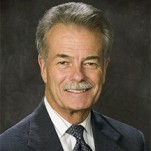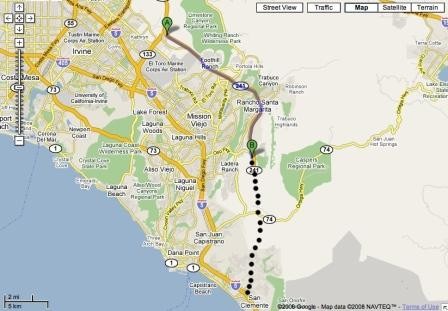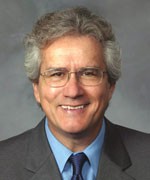
When one author praises another on a book jacket, and the second author then does the same on the first author's tome, that's logrolling. It's a practice that's also common among academics and movie critics. In politics, logrolling happens when political favors are exchanged, even among members of different parties. The Orange County Transportation Authority (OCTA) got into the logrolling game this week when it applauded the $260 billion federal transportation
reauthorization bill and, especially, language included that could speed up road construction, including another agency's 241 Foothill-South toll road expansion.
]

In heaping hosannas on congressional leaders and House Transportation and Infrastructure Chairman John Mica (R-Fla.), the OCTA was partly logrolling itself. Many changes in the way things get done that are contained in the massive federal bill are based on recommendations the OCTA presented directly to Mica's committee a February ago.
Keep in mind it was a federal agency that essentially stopped the 241 expansion route preferred by the Transportation Corridor Agencies (TCA) that cuts through San Onofre State Park and part of San Clemente. After gathering emotional testimony at the Del Mar Fairgrounds from those for and against the expansion, the U.S. Department
of Commerce's National Oceanic and Atmospheric Administration (NOAA) in December 2008 sided with the California Coastal Commission in advocating a less intrusive route to connect the existing 241 with the 5 freeway in San Clemente.
You can sense the frustration with decisions like that in the OCTA's praise of the federal transportation reauthorization bill this week: “Key provisions in the bill include breaking down bureaucratic barriers to help expedite project delivery and by making the environmental review process more efficient, integrating planning and programming approaches and delegating the responsibility for environmental review to states.”
Then came this from OCTA Chairman and Laguna Niguel Mayor Paul Glaab: “Investing in our transportation systems is essential to ensuring our country's prosperity. This bill puts America on the right track to making much-needed transportation improvements while creating jobs that pay well.”
Indeed, since the NOAA setback, the TCA has avoided going back to the drawing board to come up with another route more acceptable to the public, environmental groups and government regulators in favor of tying the lack of the route it prefers to nasty issues of the day. Gridlock on the 5 in South County? It wouldn't be there if the toll road extension was there. An inert grenade found on the 5 in South County? If it had been real and blew up the freeway, there would be a viable traffic alternative if the toll road was there. The nuclear reactor tragedy in Japan? What if it had been San Onofre and people needed to evacuate and . . . well, you get the idea.

But the one area where the transpo geniuses have actually gotten some traction is with jobs. With big ticket infrastructure projects a key to economic recovery preached by a president in the White House, and local, state and federal regulations on building (or anything else, really) considered cancers by conservatives, TCA CEO Tom Margo, OCTA CEO Will Kempton and OCTA director Peter Buffa found themselves warmly received by members of both parties on Mica's committee on Feb. 15, 2011.
The Orange Countians were there to spread the gospel of their Breaking Down Barriers initiative, a national mission “led by OCTA to expedite project delivery, without sacrificing the environment, and to accelerate the creation of more than 800,000 jobs in the U.S.” The local leaders told the congressional leaders we must get rid of governmental redundancies if we are going to move this country forward again.
Fair enough. But some of the testimony they give was aimed squarely at the power of the California Coastal Commission–which House members have no control over–to derail projects. If a different agency approved a project on environmental review, the transportation officials seemed to be saying, why should another be allowed to come up with the opposite conclusions.
Specifically, the Members of Congress were told, the full 241 toll road route has been planned since 1981, the money is there to build it out and workers with shovels, dynamite and earthmovers are just itching to get working. “Not only is this project critical to alleviating congestion in Orange County, but it will create over 34,000 jobs,” Margo told the committee, “and it requires no federal or state funding.”
But damn if the regulators don't keep getting in the way.
[

“Our agency completed the first 51 miles of our planned 67-mile toll road system in 12 years; however, we have spent the last 15 years trying to accomplish and finish the last 16 miles, as it has been mired in the federal environmental review process,” Margo lamented.
Minus the four miles at the top end that they are going to start building anyway, of course.
Margo accused the U.S. Fish and Wildlife Service of, like a salamander out of water, flip-flopping on the project, first working with the agencies to get it built, then echoing the concerns of environmental groups to possible harm to habitats.
Committee member Rep. Gary Miller (R-Diamond Bar) did some logrolling for the OC agencies while questioning Victor M. Mendez, administrator with the Federal Highway Administration.
“The problem I see out there, and being a builder for 40 years, is you will go through a process,” he said at one point. “Get the area approved, and then three different environmental groups will see you. Two want cash, and the other one will take you to court. How do you deal with that?”
Later: “We have laws in place that enable these groups to do that,” Miller complained, “and all they do is hamstring the entire process as government tries to go through local agencies in delivering projects.”
Congressman Peter A. DeFazio (D-Oregon) took some swipes at the Coastal Commission–“which has unbelievable power in your state–which is not extended to entities in any other states I am aware of.”–which had to be music to the ears of the OC transportation officials.

But it was Buffa who brought it all home.
“All of you spend a lot of your time trying to figure out how to create jobs,” the former Costa Mesa mayor and council member told the congressmen. “If you'll accept the economic crisis in the same terms as a natural disaster, those same efforts that expediting mean that you hold, as members of this committee, you hold hundreds of thousands of jobs in your hand. You just have to open your hand. They're there. Those of us who have been policymakers in transportation for a long time, I've been at this game since the mid-1980s.
“The position we are typically in is coming back here begging for money. Give us money for our project. We are not begging for money. We are talking about projects that are paid for. They are stuck in processing. If you will free that process up and you have to leave all of the environmental safeguards in place, if you'll free that process up and make it smarter, there will be an explosion of jobs nationally.”
Interesting thing about Buffa: he later resigned as a public member of the OCTA board to join Barclays Capital, an investment firm that does business with the OCTA. Going so quickly from director to someone lobbying directors and staff so concerned state Sen. Lou Correa (D-Santa Ana) that the politician introduced legislation to close the
“revolving door” that allows non-elected board members of local
agencies and commissions to lobby their former colleagues as soon
as they leave office. The bill was unanimously approved by the state
Senate before going on to the Assembly.
But back to that fateful day last February, Mica responded to the OCTA officials by saying he was looking forward to reading the final draft of their Breaking Down Barriers initiative, the one that was rolled into this week's funding legislation, the one that the OCTA rolled into its thanks to Mica's committee.

OC Weekly Editor-in-Chief Matt Coker has been engaging, enraging and entertaining readers of newspapers, magazines and websites for decades. He spent the first 13 years of his career in journalism at daily newspapers before “graduating” to OC Weekly in 1995 as the alternative newsweekly’s first calendar editor.

